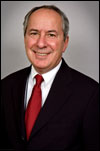State Supreme Court considers certiorari-triggering event in zoning lawsuit
In a lawsuit involving a Walworth County zoning ordinance, the Wisconsin Supreme Court considered what sorts of events can lead to a certiorari-review action.
Just call it ‘cert’
As if they were not divided enough, the U.S. Supreme Court justices are split six ways over the pronunciation of the word "certiorari," according to an article in The National Law Journal.
US high court takes up class action jurisdiction case
The U.S. Supreme Court has agreed to decide whether a stipulation by a class action plaintiff that damages will be limited to less than the $5 million threshold for federal jurisdiction is enough to defeat a motion to remove the case to federal court under the Class Action Fairness Act.
Taxation of e-discovery costs
 When it comes to electronically stored information, “[t]he fuss is about money. Discovery is expensive, and electronic discovery is really expensive.” A.L. Brown, “The Manageable Challenge of Electronic Discovery,” formerly posted at www.rkmc.com. Nevertheless, courts h[...]
When it comes to electronically stored information, “[t]he fuss is about money. Discovery is expensive, and electronic discovery is really expensive.” A.L. Brown, “The Manageable Challenge of Electronic Discovery,” formerly posted at www.rkmc.com. Nevertheless, courts h[...]
US high court poised to take another look at class actions
After a series of rulings that left some litigators questioning the future of class action litigation, the U.S. Supreme Court will wade into the issue once again next term.
US Supreme Court fractures on expert testimony issue
The Confrontation Clause does not bar an expert from testifying at a criminal trial that a DNA profile produced by an outside laboratory matched the defendant’s state lab DNA profile, the U.S. Supreme Court has ruled in a fractured opinion.
Qualified immunity decision leaves retaliatory arrest issue unsettled
The U.S. Supreme Court has declined to clearly answer the question of whether plaintiffs can bring First Amendment-based retaliatory arrest claims despite the existence of probable cause.
US Justices: Federal workers’ constitutional claims barred
The Merit Systems Protection Board provides the exclusive avenue of judicial review for federal employees’ adverse employment action challenges, even when those employees argue that a federal statute is unconstitutional, the U.S. Supreme Court has ruled.
US Supreme Court: Agents immune from retaliatory arrest suit
Secret Service agents are protected by qualified immunity from being sued for retaliatory arrest where it was not clearly established that an arrest supported by probable cause could violate the First Amendment, the U.S. Supreme Court has ruled.
‘In Chambers’ pulls back curtains at Supreme Court
A U.S. Supreme Court justice stands in his august chambers concentrating on his latest project while a law clerk looks on in admiration. Is the subject a petition for certiorari that seeks to upend decades of constitutional precedent? Hardly.
Justices tackle credit bidding in bankruptcy ‘cramdown’ plan
The justices of the U.S. Supreme Court took up a complicated bankruptcy case Monday, parsing the language of the Bankruptcy Code to determine if a Chapter 11 debtor must give a secured creditor the right to credit bid items being sold at auction.
US Supreme Court denies certiorari for Engle litigation
In between hours of oral argument over the federal health care legislation, the justices took the time to deny certiorari in the first of the Florida tobacco suits to reach the U.S. Supreme Court.
Legal News
- Wisconsin attorney loses law license, ordered to pay $16K fine
- Former Wisconsin police officer charged with 5 bestiality felony counts
- Judge reject’s Trump’s bid for a new trial in $83.3 million E. Jean Carroll defamation case
- Dozens of deaths reveal risks of injecting sedatives into people restrained by police
- The Latest: Supreme Court arguments conclude in Trump immunity case
- Net neutrality restored as FCC votes to regulate internet providers
- Wisconsin Attorney General asks Congress to expand reproductive health services
- Attorney General Kaul releases update at three-year anniversary of clergy and faith leader abuse initiative
- State Bar leaders remain deeply divided over special purpose trust
- Former Wisconsin college chancellor fired over porn career is fighting to keep his faculty post
- Pecker says he pledged to be Trump campaign’s ‘eyes and ears’ during 2016 race
- A conservative quest to limit diversity programs gains momentum in states
WLJ People
- Power 30 Personal Injury Attorneys – Russell Nicolet
- Power 30 Personal Injury Attorneys – Benjamin Nicolet
- Power 30 Personal Injury Attorneys – Dustin T. Woehl
- Power 30 Personal Injury Attorneys – Katherine Metzger
- Power 30 Personal Injury Attorneys – Joseph Ryan
- Power 30 Personal Injury Attorneys – James M. Ryan
- Power 30 Personal Injury Attorneys – Dana Wachs
- Power 30 Personal Injury Attorneys – Mark L. Thomsen
- Power 30 Personal Injury Attorneys – Matthew Lein
- Power 30 Personal Injury Attorneys – Jeffrey A. Pitman
- Power 30 Personal Injury Attorneys – William Pemberton
- Power 30 Personal Injury Attorneys – Howard S. Sicula

